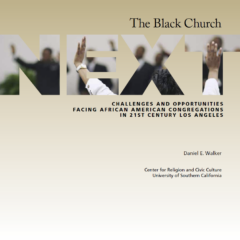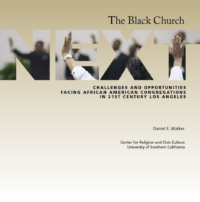For generations the church was the stalwart institution in the African American community. From providing assistance to new urban migrants to serving as the social conscience of a nation, the church was Black America’s unquestioned guide through much of the 20th century. A site of artistic expression, theological reflection, economic empowerment, and social engagement, in a very real sense, its congregants and leaders helped to define the Black experience.or generations the church was the stalwart institution in the African American community. From providing assistance to new urban migrants to serving as the social conscience of a nation, the church was Black America’s unquestioned guide through much of the 20th century. A site of artistic expression, theological reflection, economic empowerment, and social engagement, in a very real sense, its congregants and leaders helped to define the Black experience.1
While the historic role of the Black Church is clear, the early 21st century represents a period of transition and transformation. After fighting a number of internal wars over cultural and aesthetic issues like preaching styles, hip hop culture, and the role of new media in worship and practice during the latter part of the 20th century, the new millennium poses a new set of questions emanating from a number of forces external to the church itself. Including changes in demography, an entrenched economic meltdown, and the election of an African American president, these changes necessitate the Black Church taking a new look at the way it engages the public.
Using the city of Los Angeles as its target, this report hopes to bring into focus a set of finite questions in order to shine a light on some of the challenges and opportunities facing the Black Church in the city and across the nation. Given the high rate of religious participation among African Americans and the city’s status as the nation’s second largest metropolitan area, observations regarding the Black Church in Los Angeles hold the promise of impacting strategies of religious organization and social engagement nationally.2
Download a PDF of the Report
Daniel Walker was a research associate with the USC Center for Religion and Civic Culture until 2012.


